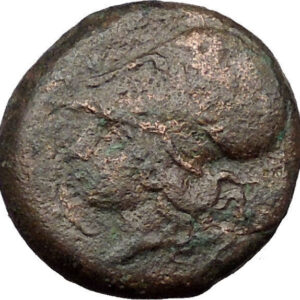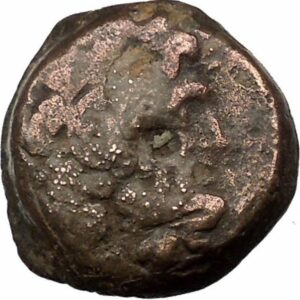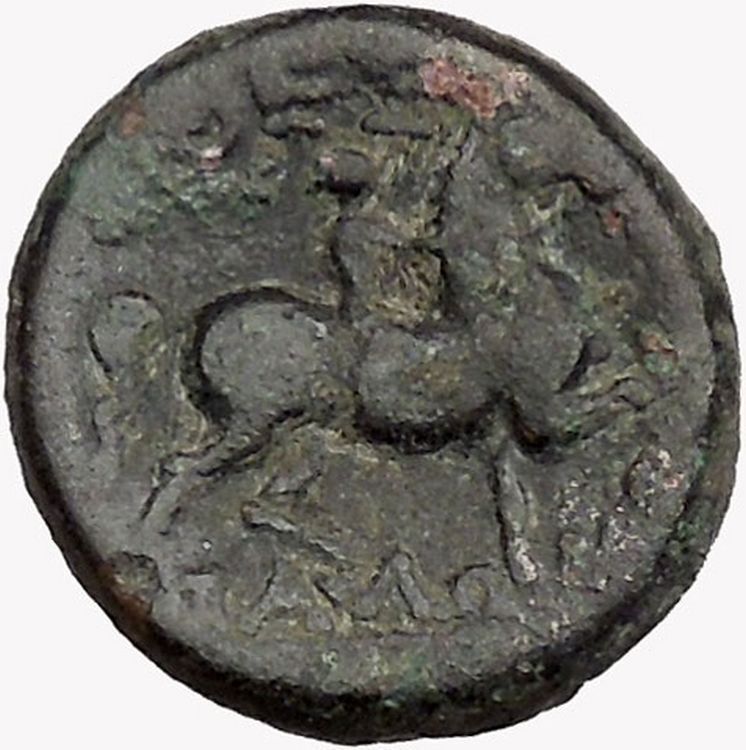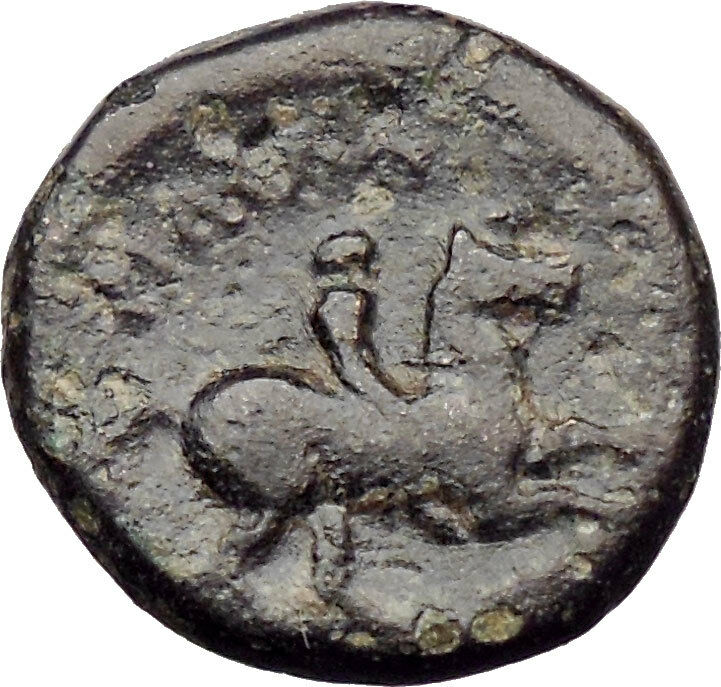|
Greek city of
Kelenderis in
Cilicia
Bronze 18mm (3.62 grams) Circa 2nd-1st century B.C.
Reference: SNG France 727-35 var.;
SNG Levante Supp. 130; SNG France -; cf. SNG von Aulock 5647
Turreted and veiled bust of
Tyche right.
Apollo standing left, holding laurel branch tied with fillets, leaning on
column upon which sits a tripod.
You are bidding on the exact item pictured,
provided with a Certificate of Authenticity and Lifetime Guarantee of
Authenticity.
Tyche (Greek for luck; the Roman equivalent was
Fortuna
) was the presiding
tutelary deity
that governed the fortune and
prosperity of a city, its destiny. Increasingly during the Hellenistic period,
cities had their own specific iconic version of Tyche, wearing a
mural crown
(a crown like the walls of the
city).

The
Greek historian Polybius
believed that when no cause can be
discovered to events such as floods, droughts, frosts or even in politics, then
the cause of these events may be fairly attributed to Tyche.
Stylianos Spyridakis concisely expressed Tyche’s appeal in a
Hellenistic world of arbitrary violence and unmeaning reverses: “In the
turbulent years of the
Epigoni of Alexander
, an awareness of the
instability of human affairs led people to believe that Tyche, the blind
mistress of Fortune, governed mankind with an inconstancy which explained the
vicissitudes of the time.”
In literature, she might be given various genealogies, as a daughter of
Hermes
and
Aphrodite
, or considered as one of the
Oceanids
, daughters of
Oceanus
and
Tethys
, or of
Zeus. She was connected with
Nemesis
and
Agathos Daimon
(“good spirit”).
She was uniquely venerated at
Itanos
in Crete, as Tyche Protogeneia,
linked with the Athenian
Protogeneia
(“firstborn”), daughter of
Erechtheus
, whose self-sacrifice saved the
city.
She had temples at
Caesarea Maritima
,
Antioch
,
Alexandria
and
Constantinople
. In
Alexandria
the Tychaeon, the temple of
Tyche, was described by
Libanius
as one of the most magnificent of the
entire Hellenistic world.
Tyche appears on many
coins
of the Hellenistic period in the three
centuries before the Christian era, especially from cities in the Aegean.
Unpredictable turns of fortune drive the complicated plotlines of
Hellenistic romances
, such as
Leucippe and Clitophon
or
Daphnis and Chloe
. She experienced a
resurgence in another era of uneasy change, the final days of publicly
sanctioned
Paganism
, between the late-fourth-century
emperors
Julian
and
Theodosius I
who definitively closed the
temples. The effectiveness of her capricious power even achieved respectability
in philosophical circles during that generation, though among poets it was a
commonplace to revile her for a fickle harlot.
In medieval art
, she was depicted as carrying a
cornucopia
, an
emblematic
ship’s rudder, and the
wheel of fortune
, or she may stand on the
wheel, presiding over the entire circle of fate.
The constellation of
Virgo
is sometimes identified as the heavenly
figure of Tyche, as well as other goddesses such as
Demeter
and
Astraea
.

In
Greek
and
Roman mythology
,
Apollo, is one of the most
important and diverse of the
Olympian deities
. The ideal of the
kouros
(a beardless youth), Apollo has been
variously recognized as a god of light and the sun; truth and prophecy;
archery
; medicine and healing; music, poetry,
and the arts; and more. Apollo is the son of
Zeus and Leto
, and has a
twin
sister, the chaste huntress
Artemis
. Apollo is known in Greek-influenced
Etruscan mythology
as Apulu. Apollo was
worshiped in both
ancient Greek
and
Roman religion
, as well as in the modern
Greco
–Roman
Neopaganism
.
As the patron of Delphi
(Pythian Apollo), Apollo was an
oracular
god — the prophetic deity of the
Delphic Oracle
. Medicine and healing were
associated with Apollo, whether through the god himself or mediated through his
son Asclepius
, yet Apollo was also seen as a god
who could bring ill-health and deadly
plague
as well as one who had the ability to
cure. Amongst the god’s custodial charges, Apollo became associated with
dominion over
colonists
, and as the patron defender of herds
and flocks. As the leader of the
Muses (Apollon Musagetes) and director of their choir, Apollo
functioned as the patron god of music and
poetry
.
Hermes
created the
lyre for him, and the instrument became a common
attribute
of Apollo. Hymns sung to Apollo were
called paeans
.
In Hellenistic times, especially during the third century BCE, as Apollo
Helios he became identified among Greeks with
Helios
,
god of the sun
, and his sister Artemis
similarly equated with
Selene
,
goddess of the moon
. In Latin texts, on the
other hand, Joseph Fontenrose declared himself unable to find any conflation of
Apollo with
Sol
among the
Augustan poets
of the first century, not even
in the conjurations of
Aeneas
and
Latinus
in
Aeneid
XII (161–215). Apollo and Helios/Sol
remained separate beings in literary and mythological texts until the third
century CE.
|










